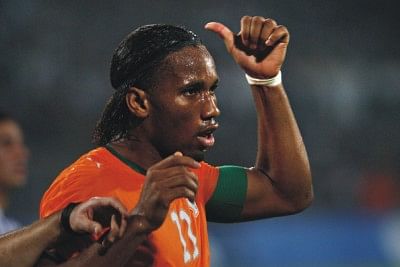Easy money and Black Swans

Didier Drogba: The Black Swan? Photo: Uriel Sinai/ Getty Images
I am surprised that more people don't bet on the World Cup. If you'll excuse me mixing my sporting metaphors, it's a slam dunk. The trick is to not bet just on your favourite team or even the team you think has the best chance of winning, but to bet on a selection of teams to win.
We have come a long way in the democratisation of footballing talent worldwide, but the simple truth remains that over the course of the tournament's 80 year history, only 7 countries have ever won the World Cup.
If we exclude Uruguay, who haven't won since 1950 and are unlikely to win ever again, and countries who have only ever won when hosting (England and France), the number of winners shrinks to four: Argentina, Brazil, Germany, and Italy, who between them have won an astonishing 14 of the 18 World Cups played so far.
Every year there are one or two new countries who merit respect and serious consideration, such as France in 1998 and Spain this year, and some countries who have never won but nevertheless are often contenders (e.g. Holland).
But for the foreseeable future, it is pretty clear that, barring something unforeseen, unpredictable, and unprecedented, it should be easy to gauge, with a reasonable amount of accuracy, the likely winner, and to bet accordingly.
Let's look at the odds. Spain is 4-1, Brazil 9-2, and Argentina 13-2. If you were to put $100 on each, you would have a very good shot of making money. If Spain were to win, you would net $200. If Brazil were to win, $250, and if Argentina were to win, you would make $450. Not bad at all for a $300 bet.
Now, if you were to want to be even safer, you could hedge your bets even further (might I suggest Italy 16/1 and Germany 14/1). I don't have the math skills to come up with the optimal amount to hedge, but back of the envelope calculations suggest that $50 on each should sort you out.
It would reduce your take by $100 if either Spain, Brazil, or Argentina, win, but if Italy were to win you would net $480 and if Germany were to win, $380.
If you really wanted to be safe you could add a few more countries to the pool with appropriate bets but still be assured of coming out ahead.
My colleague, whose judgement I trust in such matters, suggests that the best combination of risk and return can be obtained by betting on the big three, and hedging with Holland at 10-1.
The mathematical reason why there is money to be made is that there is an inefficiency in the odds market.
Each of the odds can be restated as a percentage chance of winning the tournament. So Spain's 4-1 odds can be restated as a 25% chance of winning, according to the bookies.
By definition, all the odds when added up need to equal 100% (there is 100% chance that one of the 32 teams will win).
The thing is, the bookies are obligated to assign odds to teams such as New Zealand (2,000-1) and Honduras (1,000-1) where the actual odds are in fact essentially zero, so, even at these generous odds, they are over-valued.
Even teams in the mid-range like Paraguay (100-1) and Greece (250-1) are probably over-valued.
This suggests that the teams at the top end of the range must be correspondingly under-valued, and it is in their under-valuation that the arbitrage opportunity exists.
As it happens, what I am describing here is a classic hedging strategy, what author Malcolm Gladwell calls betting on a large possibility that one will make a small amount of money against a small possibility of losing a large amount of money.
Where's the catch?
Well, with this kind of hedging strategy, there is always the risk of the unpredictable or the unprecedented happening.
Hedge fund manager and financial philosopher Nassim Nicholas Taleb has argued persuasively that most hedge funds' mathematical models seriously underestimate the possibility of an unpredictable or unprecedented event that will wipe them out.
In the context of the World Cup, there is always the possibility (even though it has never happened before) of an unfancied team coming from nowhere and taking the tournament by storm.
It can always happen. And Taleb argues that these kinds of unforeseen, if not unforeseeable, events happen far more often than we are aware.
For instance, Didier Drogba is one of the finest players on the planet, with the heart of a lion.
He recently broke his arm, but if it heals in time, who knows but that he could lead Ivory Coast (50-1) to a historic and Earth-shaking triumph that would up-end all my careful mathematical models.
Taleb has a name for this kind of event: The Black Swan.
Zafar Sobhan is Editor, Editorial & Op-Ed, The Daily Star.

 For all latest news, follow The Daily Star's Google News channel.
For all latest news, follow The Daily Star's Google News channel. 



Comments